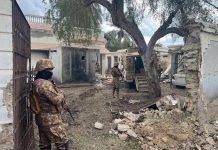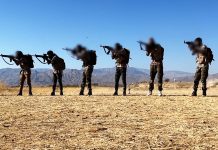This is the second operation on the TTP by Afghan Special Forces and intelligence agencies in one week.
According to The Balochistan Post correspondent in Kabul, Afghan Special Forces and intelligence agencies raided the house of Tehreek-e-Taliban-Pakistan (TTP) leader, Haji Dubai in Bacha area of Asadabad District, Kunar Province, killing 5 people and arresting 3 others.
Afghan forces raided the house around 1 am, on Thursday night.
Whereas, a week ago, Afghan forces killed five members of the Tehreek-e-Taliban Pakistan (TTP) including a key leader in Paktika province.
TTP is a radical armed group which is an umbrella organization of various militant groups based along the Afghan–Pakistani border. Its stated objective is resistance against the Pakistani state.
The TTP differs in structure to the Afghan Taliban in that it lacks a central command and is a much looser coalition of various militant groups. The TTP has almost exclusively targeted elements of the Pakistani state. The Afghan Taliban however have historically alleged of relying on support from the Pakistani army in their campaign to control Afghanistan.
The crackdown on anti-Pakistan groups in Afghanistan follows the visit of Pakistani Chief of Army Staff, General Qamar Bajwa and the ISI chief Lt Gen Faiz Hameed to Kabul, on 9 June. According to Pakistani media reports, Gen Bajwa’s visit was for assuring the Afghan leadership about Pakistan’s support for the Afghan peace process. His visit had taken place in the midst of progress towards the initiation of the intra-Afghan dialogue.
The latest operation against anti-Pakistan group occurs later the day Afghan President’s Special Representative and Ambassador to Pakistan, Atif Mashal meets Gen Bajwa in Islamabad. After the meeting he said: “Today I met with Pakistan COAS Gen Qamar Bajwa and discussed follow up of matters arising from his recent Kabul visit, Afghan peace process, upcoming APAPPS meeting, strengthening bilateral relations and the current situation in the region.”
Pakistan and Afghanistan have been at loggerheads for years. Kabul publicly blames Pakistan for harboring Taliban leaders after they were ousted from power in Afghanistan in 2001, and allowing safe havens for attacks against international and Afghan forces.
Islamabad has denied these allegations and blamed Afghanistan for giving anti-Pakistan militants refuge to plot attacks in Pakistan, which, in turn, Kabul denies.
Not only Kabul but the US has been blaming Pakistan for last 2 decades of troubles in Afghanistan. Trump administration once suspending hundreds of millions of dollars of security aid to Pakistan, said: if the war isn’t going well, Pakistan is to blame.
Pakistan’s foreign minister, Shah Mehmood Qureshi, while talking to Reuters in March this year, said that the U.S.-Taliban agreement in Doha would never have happened if Pakistan had not convinced everyone.
“We convinced the Taliban to put forward an authoritative delegation that has the capacity to implement what they agree upon, and that wouldn’t have happened without Pakistan’s facilitation,” Qureshi said.
Pakistan is widely perceived to have maintained ties with Taliban leaders, who have their families and relatives living among nearly 3 million Afghan refugees the country still hosts, VOA report said.
When a correspondent for The Balochistan Post asked Kabul-based analyst, Waheed Ahmed about the recent operations; he said that the Ashraf Ghani administration is digging its own grave by protecting Pakistan’s interests.
“The Afghan government is currently under intense pressure from various quarters due to which such wrong decisions are being taken in a rush.”
Many Afghan leaders and regional analysts believe that Pakistan’s role for peace process is a deal that in return Afghan authorities will wipe out all anti-Pakistan groups, in which Baloch pro-independence groups, taking shelter in Afghanistan might be included.
It will not be a first time experience for Baloch nationalists, as in the past Baloch political and militant leaders have been targeted in a result of such deals.
In July last year, ahead of a meeting between US President Donald Trump and Pakistani Prime Minister Imran Khan, America designated the Balochistan Liberation Army (BLA), a terrorist organisation. Baloch Liberation Army, a non-religious group that claims to be a secular entity, has waged war against Pakistan since early 2000s in a bid to achieve ‘independence of Balochistan’.
In the same month as many as 16 Members of the European Parliament (MEPs) sent a letter to the U.S president asking him to intervene in the deteriorating situation in Balochistan. The letter was also significant in the context of recent US decision to ban Baloch Liberation Army or BLA reportedly to solicit Pakistani support for Trump’s Afghan campaign.
In December 2018 a prominent leader and head of BLA was killed in a suicide attack in Kandahar province of Afghanistan, for which Baloch and Sindhi nationalists hold Pakistan responsible.
According to Baloch communities residing in various areas of Afghanistan, that recently Afghan forces are allegedly creating problems for Baloch refugees within the country. They are being suspected for no reason, being checked by forces, interrogated and being kept limited to some particular zones. Many local and regional groups and political analysts term this turn by Afghan authorities a “deal with Pakistan.”
It is pertinent to mention, that not only some Baloch nationalist leaders or groups, but thousands of Baloch civilian families have taken refuge in Afghanistan due to the war between Baloch and Pakistan, mainly during the last two insurgencies, one in 1970’s and latest since 2000 till to date, in Pakistani part of Balochistan.
As per the Baloch refugees in Afghanistan, the government has not provided them any aid or basic facilities since the beginning. They said they are deprived of medical, education even accommodation facilities, and are neglected by the both, Afghan and U.S authorities, and the recent mistreatment by authorities is addition in their miseries.






























